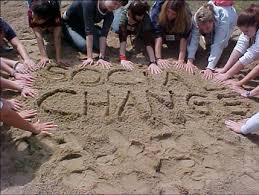 Tis the season of awesome events here in NYC, if you’re into next-generation feminism that is.
Tis the season of awesome events here in NYC, if you’re into next-generation feminism that is.
On THURSDAY, the National Council for Research on Women will hold a special session as part of their Annual Conference on Igniting Change, called “Youth: Opportunities and Challenges for Building Leadership Pipelines”. The session takes place from 9:00 am – 10:30 am in Room 9205 at CUNY Graduate Center. Here’s the descript: As tomorrow’s voters and leaders, young women need to be vital partners in advancing the movement for social justice. This means working in partnership with young women, recognizing and valuing their diversity, to understand their perspectives and concerns and foster programs that emphasize both their rights and civic responsibilities. The panel will highlight current issues facing young women and address structural and cultural factors that support or hinder their empowerment. Attention will also be given to strategies for working across generational and cultural differences to build a viable movement.” Speakers include Rosalina Diaz-Miranda, Medgar Evers College, CUNY; Supriya Pillai, Funders’ Collaborative on Youth Organizing; Kim Salmond, Girl Scouts of the USA; Ellen Silber, Graduate School of Social Service, Fordham University; Sally Stevens, Southwest Institute for Research on Women, University of Arizona; and Liz Abzug, Bella Abzug Leadership Institute.
On FRIDAY, the blog of all blogs, Feministing, is throwing a 5th anniversary fundraising bash. Even if you can’t go, you can still contribute!
On SUNDAY, Girls Write Now will hold their Annual Spring Reading from 4-6pm at The New School, Tishman Auditorium, 66 W. 12th Street. Some of NYC’s best teen writers will showcase original work, and keynote speaker Amy Robach and featured reader National Book Award Nominee Jean Thompson will be there too. The event is FREE and open to the public.
And that’s just this week!

 So I loves me a campus visit, but my visit to Framingham State College on Monday — though exhausting! — took the cake. Heartfelt thanks to superorganizer Virginia Rutter and her amazing crew: Lisa Eck, Bridgette Sheridan, the Gender Interest Group, English, History, Psychology, Sociology, Academic Affairs, President’s Office, Wellness Center, and Women’s Empowerment, with special kudos to students Chelsea Hastbacka and Ashley Barry.
So I loves me a campus visit, but my visit to Framingham State College on Monday — though exhausting! — took the cake. Heartfelt thanks to superorganizer Virginia Rutter and her amazing crew: Lisa Eck, Bridgette Sheridan, the Gender Interest Group, English, History, Psychology, Sociology, Academic Affairs, President’s Office, Wellness Center, and Women’s Empowerment, with special kudos to students Chelsea Hastbacka and Ashley Barry. As I wrap up this liveblogging session from the Brooklyn Museum, a gooey little confession about how the
As I wrap up this liveblogging session from the Brooklyn Museum, a gooey little confession about how the  Here we are, at 92Y Tribeca. From left to right: Courtney Martin, Elizabeth Hines, Gloria Feldt, and me. Logo on screen done by Marco. Thanks to everyone for coming out, props to the great staff at the Y, and endless gratitude to my fellow WGLs — of all the different things I do, doing this panel with them is hands down one of my FAVES.
Here we are, at 92Y Tribeca. From left to right: Courtney Martin, Elizabeth Hines, Gloria Feldt, and me. Logo on screen done by Marco. Thanks to everyone for coming out, props to the great staff at the Y, and endless gratitude to my fellow WGLs — of all the different things I do, doing this panel with them is hands down one of my FAVES. Intergenerational convo–my fave subject, as you know!–currently going on over at RH Reality Check:
Intergenerational convo–my fave subject, as you know!–currently going on over at RH Reality Check: …what of the youth shaped by what some are already calling the Great Recession? Will a publication looking back from 2030 damn them with such faint praise? Will they marry younger, be satisfied with stable but less exciting jobs? Will their children mock them for reusing tea bags and counting pennies as if this paycheck were the last? At the very least, they will reckon with tremendous instability, just as their Depression forebears did.
…what of the youth shaped by what some are already calling the Great Recession? Will a publication looking back from 2030 damn them with such faint praise? Will they marry younger, be satisfied with stable but less exciting jobs? Will their children mock them for reusing tea bags and counting pennies as if this paycheck were the last? At the very least, they will reckon with tremendous instability, just as their Depression forebears did. I’m THRILLED to announce that my nationally touring (whohoo!) intergenerational panel, “Women, Girls, and Ladies” will be
I’m THRILLED to announce that my nationally touring (whohoo!) intergenerational panel, “Women, Girls, and Ladies” will be  GWP’s
GWP’s 